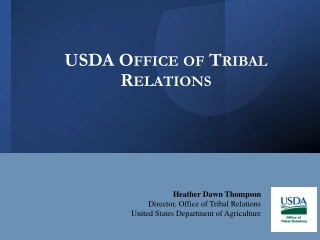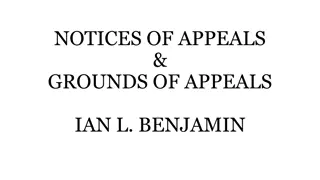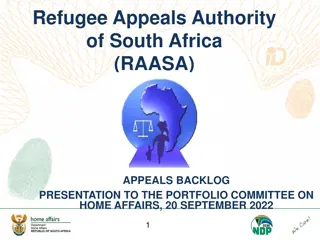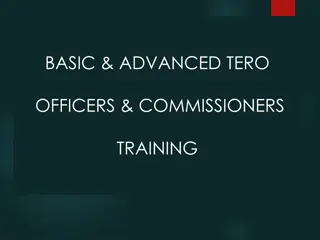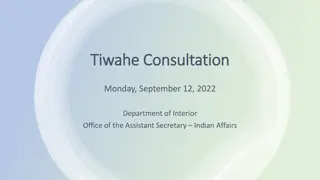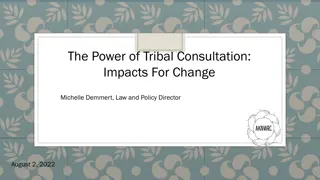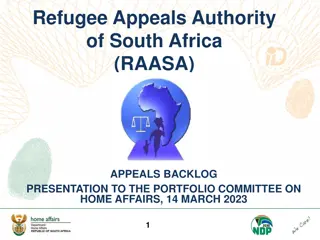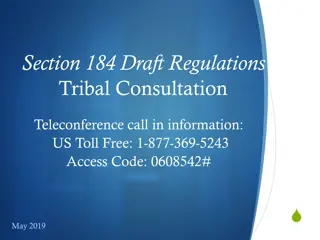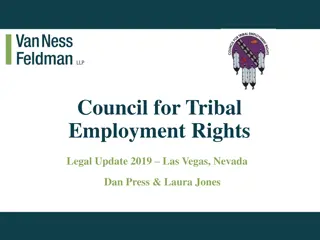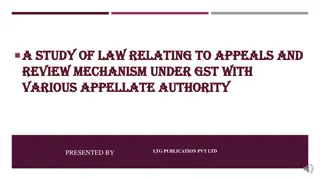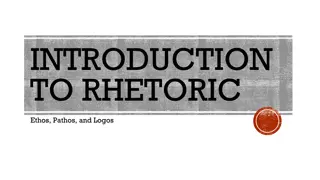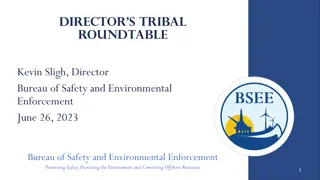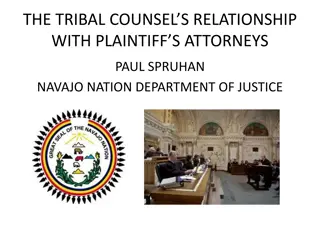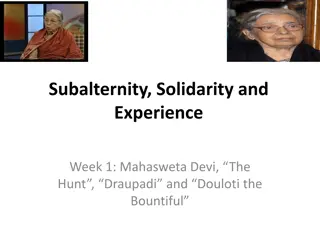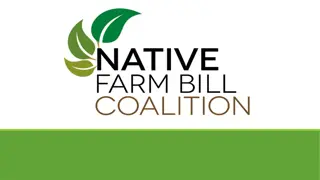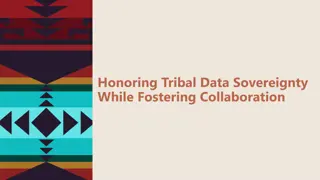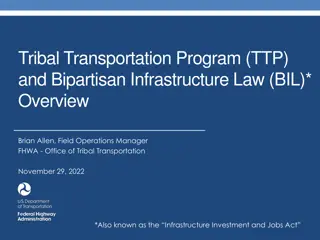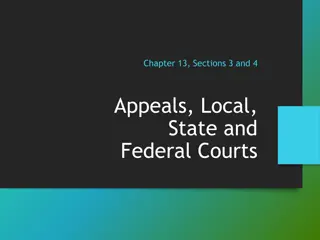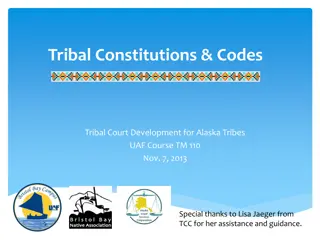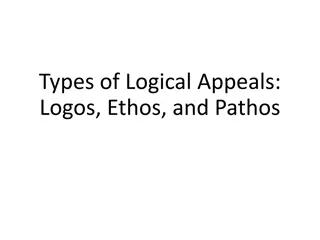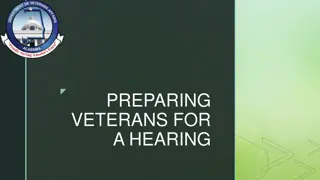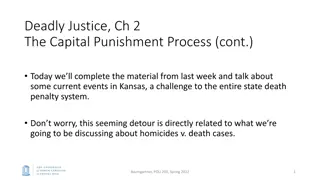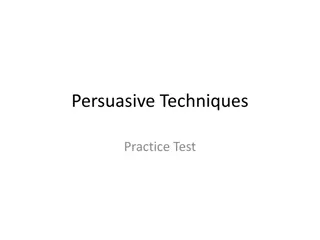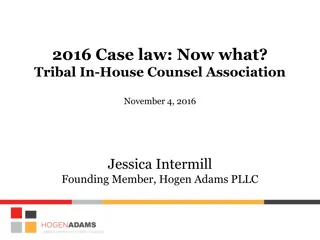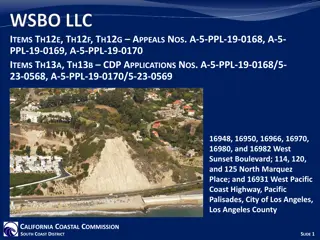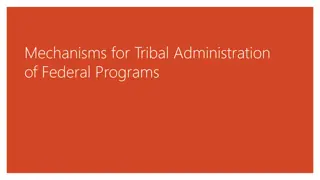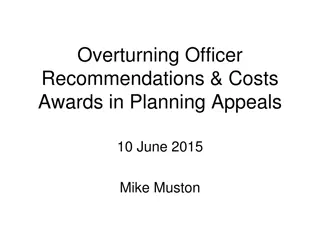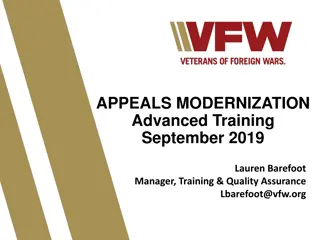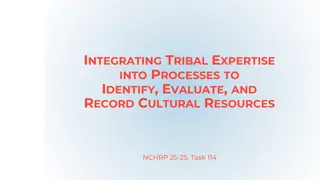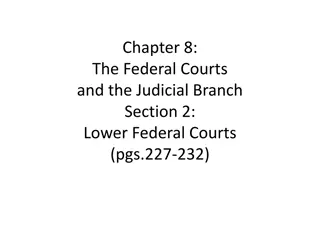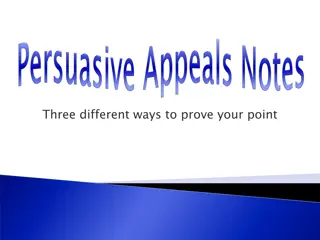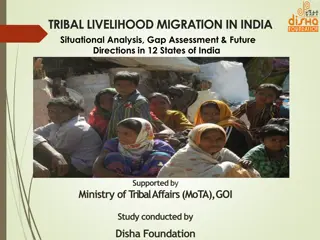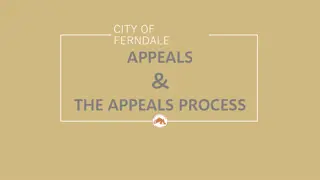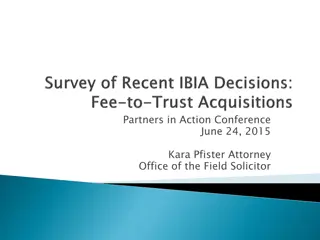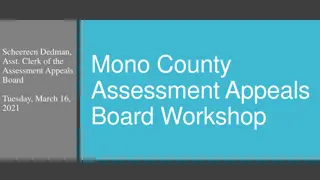Prior: Art. 66(b)(1): Appeals by Accused – A Court of Criminal Appeals shall have jurisdiction of a timely appeal from the judgment of a court -martial , entered into the record under section 860c of this title (article 60c), as follows:
The content outlines amendments introduced in the FY23 NDAA regarding appeals by accused individuals in court-martial cases and modifications to court-martial findings and sentences. It details the expansion of jurisdiction for Court of Criminal Appeals, the powers granted to the Judge Advocate Gene
2 views • 12 slides
USDA Tribal Relations and Federal Policy in Native Agriculture
Explore the role of the USDA Office of Tribal Relations and the USDA Tribal Advisory Committee in addressing barriers and federal policies impacting tribal agriculture. Learn about tribal eligibility, statutory requirements, and the historical eras of federal Indian policy affecting Native American
0 views • 36 slides
Rights of Appeal in Legal Proceedings
This text discusses the statutory rights of appeal against decisions in legal proceedings, highlighting the importance of understanding the procedures and enactments that govern the appeals process. It specifically focuses on appealing decisions to the High Court related to various professional bodi
0 views • 60 slides
Addressing the Refugee Appeals Backlog in South Africa
The Refugee Appeals Authority of South Africa (RAASA) faces a backlog of appeals due to various reasons, including an influx of asylum seekers in 2009 and challenges with economic migrants. The introduction outlines the establishment and mandate of RAASA, highlighting efforts to address the backlog
0 views • 27 slides
Tribal Workforce Protection and Sovereignty-based Legislation
Tribal workforce protection and sovereignty-based legislation play a crucial role in safeguarding diverse workforces from discrimination, harassment, and disparate treatment. This legislation, enacted by Tribal Governments, aims to ensure equal rights and opportunities for individuals regardless of
1 views • 22 slides
Tiwahe Consultation: Empowering Tribes for Community Development
Tiwahe, meaning "Family" in Lakota, focuses on empowering Tribes to design programs integrating services with Tribal culture for community benefit. Components include Job Placement, Social Services, Housing, and more. Funding from 2015-2020 supported various initiatives. The Tiwahe Initiative center
0 views • 9 slides
The Power of Tribal Consultation: Enhancing Government-to-Government Dialogue
This compilation highlights the significance of tribal consultation in strengthening relationships between the federal government and Tribal Nations, emphasizing the need for inclusive policy deliberation. It underscores the critical role of feedback opportunities, joint coordination, and communicat
0 views • 8 slides
Refugee Appeals Authority of South Africa (RAASA) Appeals Backlog Presentation
The Refugee Appeals Authority of South Africa (RAASA) presented progress on appeals backlog to the Portfolio Committee on Home Affairs in March 2023. RAASA, an independent statutory body, hears and determines appeals against decisions of Refugee Status Determination Officers. The presentation outlin
0 views • 31 slides
Comprehensive Overview of Section 184 Draft Regulations for Tribal Consultation
This detailed document provides essential information on the Section 184 Draft Regulations for Tribal Consultation, including call-in details, program requirements, lender eligibility, tribal participation, servicing, claims, and more. It covers definitions, lender application processes, tribal elig
6 views • 20 slides
Tribal Employment Rights and Jurisdiction: Legal Update 2019
The legal update discusses the basis for tribal employment authority, Indian preference in hiring, tribal jurisdiction over non-Indians, exceptions under the Montana Test, and tribal jurisdiction over rights-of-way. It highlights the sovereign authority of American Indian tribes, statutory recogniti
5 views • 8 slides
Measures of Protection for Tribal Development in India
The post-independence era in India saw significant efforts towards tribal development, emphasizing principles like respecting tribal rights, preserving culture, and avoiding imposition. Various viewpoints were presented, including policies of isolation, assimilation, and integration. These approache
1 views • 14 slides
Update on UNHCR's Asylum Appeals Backlog Project in South Africa
The presentation by the UNHCR highlighted the background, successes, and challenges of the Asylum Appeals Backlog Project in South Africa. The project aims to eliminate the existing backlog of 153,000 appeals and prevent new backlogs, with a focus on digitization, research, and efficient decision-ma
0 views • 7 slides
Understanding Appeals and Review Mechanism under GST
Explore the appellate authorities involved in the GST appeal process, from the First Appellate Authority to the Supreme Court. Learn about the power of revisional authority, appeals to the High Court, and appeals to the Supreme Court. Discover the process by which aggrieved parties can seek redressa
1 views • 6 slides
Understanding Rhetoric: Ethos, Pathos, Logos
Rhetoric is the art of persuasive communication in various contexts. It involves utilizing ethos (credibility), pathos (emotions), and logos (logic) to influence the audience. Distinguishing between argument and persuasion, this communication form employs elements such as organization patterns, appe
4 views • 18 slides
Veterans Benefits Appeals and Legacy Appeals Process
Learn about the appeals process for denied VA benefits claims and the legacy appeals system for claims decided before February 19, 2019. Understand your rights to appeal decisions, examples of appealable decisions, actions that cannot be appealed, and the differences between Legacy Appeals and the A
3 views • 78 slides
Bureau of Safety and Environmental Enforcement Tribal Roundtable
The Bureau of Safety and Environmental Enforcement's Tribal Roundtable, led by Director Kevin Sligh, focuses on promoting safety, protecting the environment, and conserving offshore resources. The agenda includes discussions on carbon sequestration, oil spill response preparedness, renewable energy,
2 views • 30 slides
Tribal Court Dynamics: Relationship, Reasons, and Examples
Explore the dynamics of tribal court systems, including the relationship between tribal counsel and plaintiff attorneys, potential reasons for using tribal tort law in court, jurisdictional challenges faced, and examples from Navajo and Non-Navajo cases.
1 views • 9 slides
Mahasweta Devi: Championing Tribal Rights Through Literature
Mahasweta Devi, an Indian writer and tribal activist, uses her powerful writings to shed light on the plight of tribal communities in India. Through her works like "The Hunt" and "Draupadi", Devi addresses issues of exploitation, deforestation, and gender identity, highlighting the strength and stru
3 views • 15 slides
Native Farm Bill Coalition: Supporting Tribal Provisions and Consultation
Over 170 tribes and 77 Native Nations are represented in the Native Farm Bill Coalition, advocating for 63 tribal-specific provisions in the Farm Bill. The coalition welcomes more tribal leadership and organizations to join, offering tailored support, updates, and resources. Additionally, an upcomin
0 views • 9 slides
Fostering Tribal Data Sovereignty in Collaborative Partnerships
Explore the significance of data sovereignty within Tribal Advisory Committees (TACs) and the Government Accountability Office (GAO), considering how tribal data sharing can be respectful of sovereignty. Delve into the impact of data on tribal communities, the unique role of the GAO, and discuss str
0 views • 11 slides
Tribal Transportation Program & Bipartisan Infrastructure Law Overview
The Tribal Transportation Program (TTP) and Bipartisan Infrastructure Law (BIL) provide funding for essential transportation projects in Tribal communities. The TTP Bridge Fund, Safety Fund, and High Priority Projects aim to improve infrastructure and safety. The BIL funding for FY22-FY26 totals $3.
1 views • 13 slides
Exploring Appeals and Court Systems: Chapter 13 Overview
This educational content delves into the intricacies of appeals in the legal system, covering characteristics of successful appeals, procedures at appeals courts, the role of precedent, jurisdiction determination, and an overview of federal, state, and local court structures. The material also discu
0 views • 24 slides
Understanding Tribal Constitutions and Court Development for Alaska Tribes
Explore the significance of tribal constitutions, court codes, and the development of tribal courts for Alaska tribes. Learn about the functions, importance, and provisions of tribal constitutions and codes, as well as their role in governing tribal activities and promoting cultural traditions. Disc
1 views • 18 slides
Understanding the Three Types of Logical Appeals: Logos, Ethos, and Pathos
Explore the different types of logical appeals used in writing - Logos (appeals to reason), Ethos (appeals to values), and Pathos (appeals to emotions). Learn how to balance these appeals to create a persuasive argument and avoid overreliance on emotional manipulation.
0 views • 7 slides
Guide to Preparing Veterans for Hearings
This segment provides insights on preparing veterans for in-person hearings during the appeals process. It covers types of hearings, the role of Decision Review Officers (DRO) and Board of Veterans Appeals (BVA), and how to assist veterans in understanding the reasons for denial and choosing the rig
0 views • 12 slides
The Capital Punishment Process: Aggravators, Mitigators, and Post-Conviction Appeals
The continuation of the discussion on the capital punishment process, specifically focusing on the bifurcated trial, the consideration of aggravators and mitigators, post-conviction appeals including direct appeal and Habeas Corpus appeals, and the importance of proportionality review in state supre
0 views • 25 slides
Mastering Persuasive Techniques: Practice Test Insights
Explore the art of persuasion through practice test scenarios covering logical, ethical, and emotional appeals, with examples and explanations. Identify various persuasive techniques like logical appeals, ethical appeals, and appeal to loyalty, while also recognizing loaded language in persuasive me
0 views • 25 slides
Tribal In-House Counsel Association 2016 Case Law Update
Explore key cases and developments in tribal law from 2016, including Supreme Court decisions impacting tribal sovereignty and immunity. Gain insights on ongoing cases, such as Lewis v. Clarke, and considerations for tribal jurisdiction. Stay informed on the latest legal issues affecting Indian trib
0 views • 11 slides
City of Los Angeles Development Project Appeals Overview
The content details appeals filed for development projects in Los Angeles, focusing on changes in development potential, project alternatives, tree removal concerns, and staff recommendations. It includes images and information on the project locations, city-approved developments, issues under appea
0 views • 16 slides
Empowering Tribal Sovereignty through Self-Governance of Federal Programs
Exploring mechanisms for tribal administration of federal programs, focusing on the Indian Self-Determination and Education Assistance Act. It highlights self-governing initiatives in areas like transportation and employment training, emphasizing tribal control and decision-making authority over res
0 views • 8 slides
Understanding Costs Awards and Officer Recommendations in Planning Appeals
Explore the significance of material considerations and development plans in planning appeals, the implications of overturning officer recommendations, the different types of appeals, and the criteria for costs awards. Learn about the introduction of costs awards, behaviors that may lead to unnecess
0 views • 12 slides
Veterans Appeals Modernization Overview
The Veterans Appeals Modernization Act of 2017 (AMA) aims to ensure fair and timely appeals decisions for veterans. The act introduces changes to streamline the appeals process, offer more options for veterans, and protect their rights. Key aspects include understanding changes created by AMA, ident
0 views • 58 slides
Integrating Tribal Expertise into Cultural Resource Processes
This project, NCHRP 25-25 Task 114, focuses on incorporating tribal perspectives and expertise into the Section 106 process of the National Historic Preservation Act for surface transportation projects. The research objective is to understand how tribal knowledge informs the identification, evaluati
0 views • 19 slides
Understanding the Federal Court System in the United States
The Federal Court system in the United States comprises District Courts, handling a vast number of cases each year, with each district having multiple judges. These courts have jurisdiction over a range of cases, including civil rights violations, employment disputes, criminal offenses, and bankrupt
0 views • 11 slides
Effective Persuasion Strategies: Logos, Pathos, and Ethos
Learn about three powerful ways to strengthen your arguments and make them more convincing: logical appeals (logos), emotional appeals (pathos), and ethical appeals (ethos). Discover how to use facts, statistics, expert opinions, loaded language, sensory details, and author credibility to appeal to
0 views • 9 slides
CDC Tribal Advisory Committee Update and Public Health Initiatives
Centers for Disease Control (CDC) works with tribal governments, focusing on public health initiatives to support tribal sovereignty and self-determination. The CDC/ATSDR Tribal Advisory Committee (TAC) provides input and guidance on health issues in AI/AN nations, emphasizing government-to-governme
0 views • 12 slides
Tribal Livelihood Migration in India: Situation Analysis and Future Directions
Conducted by Disha Foundation and supported by the Ministry of Tribal Affairs, Government of India, this study focuses on assessing tribal livelihood migration in 12 states of India. The research objectives include analyzing reasons, patterns, challenges, and existing policies and programs related t
0 views • 20 slides
Understanding the Appeals Process in the City of Ferndale
Appeals play a crucial role in municipal decision-making, allowing parties to request a review of final decisions made by designated authorities. This process ensures that local decisions align with adopted laws and procedures, providing opportunities for aggrieved parties to challenge administrativ
0 views • 15 slides
Overview of Indian Board of Indian Appeals (IBIA) Decisions
The Indian Board of Indian Appeals (IBIA) exercises delegated authority from the Secretary of the Interior to provide independent review of decisions made by Bureau of Indian Affairs (BIA) officials. The IBIA consists of three administrative law judges and considers appeals on various issues such as
0 views • 38 slides
Understanding Assessment Appeals Process in Mono County
Explore the Assessment Appeals process in Mono County, including types of assessments, appeal deadlines, Board structure, and the appeal process. Learn how the Assessment Appeals Board functions, how to work with the Assessor's Office, and the statutory requirements for holding business meetings. Ga
0 views • 10 slides

